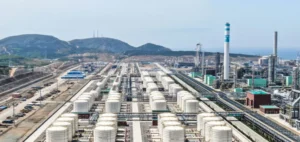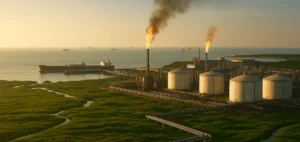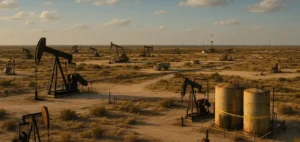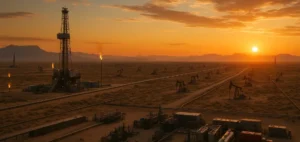The British oil giant Shell announced Thursday a strong increase in profit for the first quarter, closing a season of flamboyant results for the “majors” of the sector, despite the decline in oil prices.
Together, BP, Shell, ExxonMobil, Chevron and TotalEnergies posted more than $40 billion (36 billion euros) in profits this quarter. For Shell, net profit, group share, rose by 22% year-on-year to $8.7 billion. Its results benefited in particular from lower operating expenses and a better performance in chemistry. Its quarterly revenues were $89 billion (+7%).
Shell’s first-quarter results enjoy a comparative advantage over the same period last year, at the start of the Russian invasion of Ukraine, when the energy giant passed a hefty $3.9 billion charge related to its phase-out of Russia, far less than that of its rival BP, however. Shell Chief Executive Wael Sawan welcomed “strong” results in a statement Thursday and said the group will start a $4 billion share buyback program over the next three months.
This announcement pushed the share price up 2% to 2,373 pence on the London Stock Exchange around 08:30 GMT. Michael Hewson, analyst at CMC Markets, notes that the stock has fallen since March on a “combination of concerns about a slowdown in global demand”, given the risks of a recession and banking crisis that persist, “and because of a sharp decline in oil and gas prices” over the past year. Prices had soared in the wake of Russia’s invasion of Ukraine, pushing the sector’s earnings to record highs last year, before falling back, to the point where the Opec+ cartel of producing countries recently intervened by cutting production in an attempt to support them.
“Despite the pressure on crude prices, Shell is distributing vast amounts of cash” to its shareholders, “but this should undoubtedly revive calls for more contributions to Treasury coffers,” judges Derren Nathan, an analyst at Hargreaves Lansdown. Especially since energy bills, which have largely contributed to a cost of living crisis in the UK and elsewhere, have not decreased.
“Obscene Profits”
Pro-environment NGOs are planning to demonstrate in front of Shell’s headquarters, after having disrupted the AGMs of BP or Barclays, a bank they accuse of over-financing the extraction of polluting hydrocarbons and contributing to global warming. “The British government should stop issuing new oil and gas extraction permits and force Shell and the rest of the industry to start using their obscene profits to repair the damage their fossil fuels are causing around the world,” Greenpeace said in a statement.
BP, however, won the majority of votes at its general meeting on Thursday, despite a notable share of shareholders upset about its decision to slow down its energy transition or against its compensation plan. The British group had announced in February, on the sidelines of record annual results, that it intended to boost its profits by 2030 by investing more in both renewable energies and hydrocarbons, slowing the pace of its energy transition.
TotalEnergies, which posted a 12% increase in first-quarter profit to $5.6 billion, is preparing for a heated climate debate with some of its shareholders at its AGM on May 26.
Across the Atlantic, ExxonMobil did particularly well: its net profit more than doubled year-on-year to $11.4 billion, a record for a first quarter.
Chevron’s net profit rose by 5% to $6.6 billion. In the midst of the economic crisis, the pay of former Shell boss Ben van Beurden rose last year to £9.7 million (€11.4 million), an increase of 53% over one year.





















